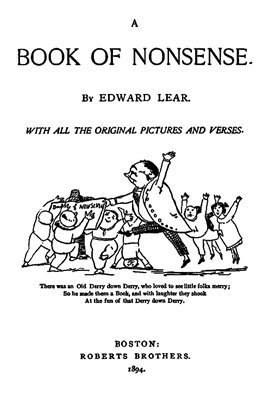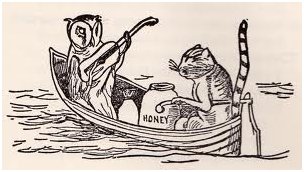‘There was an Old Derry down Derry, who loved to see little folks merry’
Edward Lear, despite his talents as a landscape painter and illustrator, is now best remembered for his nonsense verse and accompanying comic drawings. His friends’ children were always delighted when he came for a visit. When he tired of engaging in sensible, polite conversation with the grownups he knew he could always escape into nonsense with the children.
His first publication of this sort, A Book of Nonsense (1846), was written while he was living in the Earl of Derby’s household. He composed the poems in this book to entertain the Earl’s grandchildren and they have gone on entertaining readers of all ages.
The limerick below the frontispiece illustration below reads:
There was an Old Derry down Derry, who loved to see little folks merry;
So he made them a book, and with laughter they shook
At the fun of that Derry down Derry.
Derry is a meaningless word that is traditionally used in the refrains of popular songs and is the perfect word to use for the name of the fictitious speaker in the poems. From the first page Lear makes it clear that his goal is to delight children; I doubt he expected his verse to go on delighting children of all ages into the twenty-first century. When it was published, Lear was surprised at the book’s success. He first published it anonymously, but after hearing people talk about how much they enjoyed it and try to guess who might have written it, he published subsequent editions under his name.
I doubt he expected his verse to go on delighting children of all ages into the twenty-first century. When it was published, Lear was surprised at the book’s success. He first published it anonymously, but after hearing people talk about how much they enjoyed it and try to guess who might have written it, he published subsequent editions under his name.
Though I am not aware of any particular nonsense poems or drawings produced at Farringford, Lear would certainly have made at least a few sketches with which to entertain Hallam and Lionel Tennyson. His letters indicate that he was close to the boys. In his letters to Emily he always asks after their health and education. We also have a few letters that he wrote to them directly about proposed visits to the family—it is as though he knew they were likely to eagerly welcome a visit from the Old Derry down Derry.
The Owl and The Pussy Cat
Among his most popular nonsense poems is ‘The Owl and the Pussy-cat’. After they set out to sea the pussy-cat proposes to the owl and they sail ‘for a year and a day’ before they find a ring. The ring, of course, is in a Piggy-wig’s nose and they buy it for a shilling.  The following day the Turkey on the hill marries them and they dine ‘dined on mince, and slices of quince, / Which they ate with a runcible spoon’ (lines 27-28). This poem clearly demonstrates Lear’s delight in playing with language. Not only has he created a fantastical world in which owls, cats, pigs, and turkeys get on with one another, he also makes up new words to suit his needs. According to the Oxford English Dictionary, the word runcible was coined by Lear as a nonsense word. It’s not meant to mean anything in particular and this fanciful word is applied in other poems to such various things as cats, walls, geese, and men.
The following day the Turkey on the hill marries them and they dine ‘dined on mince, and slices of quince, / Which they ate with a runcible spoon’ (lines 27-28). This poem clearly demonstrates Lear’s delight in playing with language. Not only has he created a fantastical world in which owls, cats, pigs, and turkeys get on with one another, he also makes up new words to suit his needs. According to the Oxford English Dictionary, the word runcible was coined by Lear as a nonsense word. It’s not meant to mean anything in particular and this fanciful word is applied in other poems to such various things as cats, walls, geese, and men.
You can explore drawings and excerpts from Lear’s nonsense works here. Which are your favourites? Did you read his nonsense verse as a child or share it with your own children?